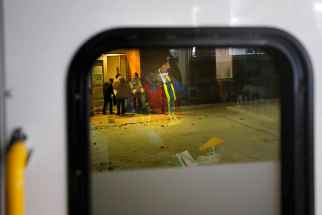Warm-hearted call of duty Salvation Army trio puts concern for others ahead of their own well-being during frigid overnight shift in early days of pandemic, offering hot coffee, food, winter gear and rides to people on the street
Read this article for free:
or
Already have an account? Log in here »
To continue reading, please subscribe:
Monthly Digital Subscription
$0 for the first 4 weeks*
- Enjoy unlimited reading on winnipegfreepress.com
- Read the E-Edition, our digital replica newspaper
- Access News Break, our award-winning app
- Play interactive puzzles
*No charge for 4 weeks then price increases to the regular rate of $19.00 plus GST every four weeks. Offer available to new and qualified returning subscribers only. Cancel any time.
Monthly Digital Subscription
$4.75/week*
- Enjoy unlimited reading on winnipegfreepress.com
- Read the E-Edition, our digital replica newspaper
- Access News Break, our award-winning app
- Play interactive puzzles
*Billed as $19 plus GST every four weeks. Cancel any time.
To continue reading, please subscribe:
Add Free Press access to your Brandon Sun subscription for only an additional
$1 for the first 4 weeks*
*Your next subscription payment will increase by $1.00 and you will be charged $16.99 plus GST for four weeks. After four weeks, your payment will increase to $23.99 plus GST every four weeks.
Read unlimited articles for free today:
or
Already have an account? Log in here »
Hey there, time traveller!
This article was published 28/12/2020 (1808 days ago), so information in it may no longer be current.
”I am an Aboriginal woman who is one of those women whose mother reported missing. I can’t imagine the countless days she probably just wished that when the phone rang it was me calling home. I have yet to make that call. I only talk to her when I find comfort in the streets and find a silent moment to just speak to the wind and hope my words find her somehow.”– Desirae
The night begins with a prayer, an incantation from the lips of three faithful members of the flock, standing in dim light with clasped hands as they implore God to direct them where help is needed most.
It’s a predictable start given the setting — the Salvation Army — where Merv Halvorsen, a longtime pastor with the non-profit religious group, is preparing to lead an outreach team into the streets of Winnipeg during the COVID-19 pandemic.
Life on the strip
The costs of homelessness — both in fiscal resources and human misery — are difficult to fathom. And the problem, which has has plagued Winnipeg for decades, is growing.
In order to better understand the issue, the Free Press spent the past year documenting life on the streets and in the shelters.
The costs of homelessness — both in fiscal resources and human misery — are difficult to fathom. And the problem, which has has plagued Winnipeg for decades, is growing.
The costs of homelessness — both in fiscal resources and human misery — are difficult to fathom. And the problem, which has has plagued Winnipeg for decades, is growing.
In order to better understand the issue, the Free Press spent the past year documenting life on the streets and in the shelters, interviewing advocates, community activists and academics, reviewing research papers, shadowing social-service workers and consulting people with expertise gained through lived experience.
The result is Life on the Strip: A year-long examination of Main Street homelessness.
At the start of each instalment is a quote from Desirae, one of the people profiled in this series. She lives on the streets of Winnipeg in a tent. The quotes are excerpted from an essay she wrote and submitted to the Free Press.
See the full series at wfp.to/lifeonthestrip
The plan is to find as many people experiencing homelessness as possible and help them any way they can — a bottle of water or loaf of bread, a toque or scarf, or a trip to the overnight shelter or methamphetamine detox.
The kitchen floor is freshly mopped and Halvorsen, 56, slips and nearly falls as he carries a large container of coffee, pre-mixed with plenty of sugar, toward the garage, where a retrofitted, decommissioned ambulance awaits him.
Above the counter and prep table hangs a series of kitchen utensils: cups and colanders, spoons and spatulas, pots and pans. Laminated posters warning of the dangers of the coronavirus and the need to wash hands are plastered on the walls.
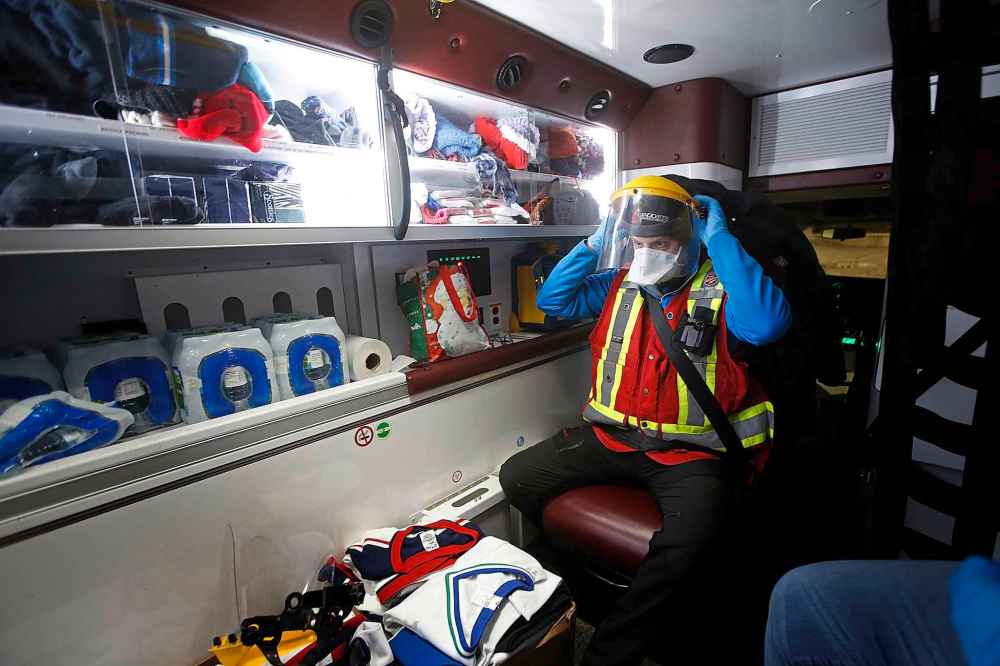
A half moon glows in the sky as Halvorsen manoeuvres the old ambulance — which the Salvation Army calls its Extreme Environment Response Vehicle — out of the garage with a tight two-point turn, before steering it down the back alley and into the slush-covered streets.
It is 10:56 p.m., and virus be damned, Halvorsen heads out in search of people in need.
Seated next to him is John Burton, 55, and in the back cabin is Kathryn Dueck, 28, both cadets in the Salvation Army. The trio plans to be out for five hours, from 11 p.m. to 4 a.m., stopping by the spots — encampments and bus shelters — where they know homeless folks will be.
The team is outfitted with face masks, gloves and glasses to protect them from the virus. But truth be told, they aren’t that worried about the risks. It’s not that they don’t believe the virus is deadly — they do. They just believe in the importance of the work they’re doing that much more.
”So as long as this work is actually helping people, I think this is the time to take that risk.”-Kathryn Dueck
“We can always take the necessary precautions, but there comes a time when you’ve got to be willing to risk a little bit. So as long as this work is actually helping people, I think this is the time to take that risk,” Dueck says, as the vehicle comes to a stop at the biggest camp off the strip.
Halvorsen honks the horn four times to notify the residents they’ve arrived. One man approaches the vehicle shivering, with his hands at his elbows, and asks for a cup of coffee. White film is caked at the corners of his mouth.
Fresh snow, light like powder, covers the ground, and with each step the man takes, a perfect footprint is left behind. From inside a tent, another man shouts that it’s too cold to come out.
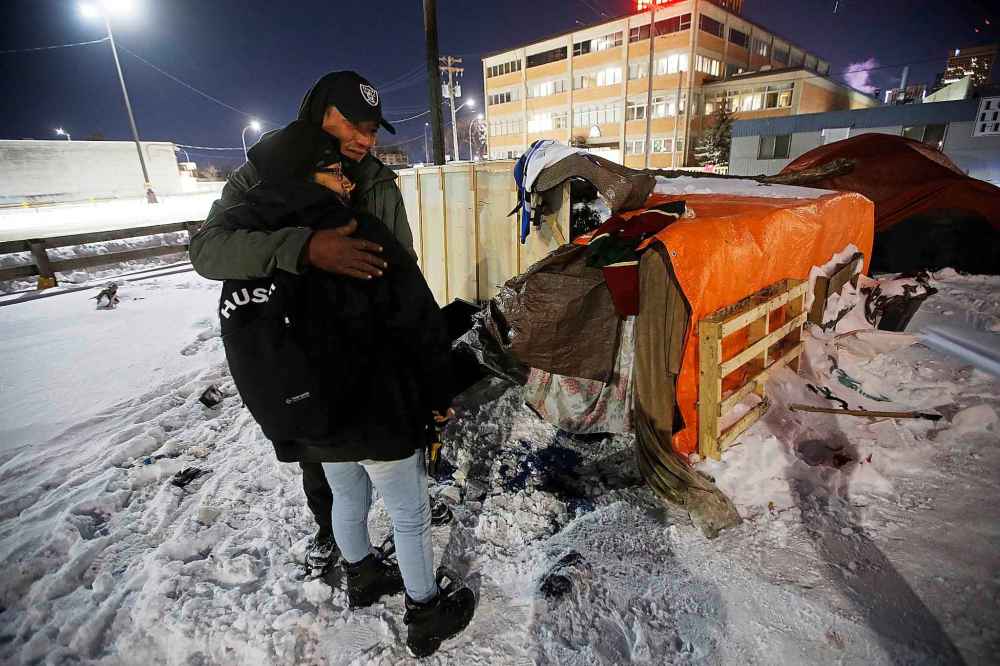
Off to the side stand Kyle and Desirae, bracing themselves against the wind, seemingly uninterested in what the outreach team has to offer. Kyle’s arm is wrapped around her as the couple announces that two weeks prior, they got engaged.
Desirae shows off the ring on the third finger of her left hand, and throws her head back, laughing.
But just as quick as they announce the engagement, they’re on to another topic. Just as Kyle vowed it would, the camp has formed again after being taken down by the city in January; he came right back, and since then, he and Desirae have been joined by a dozen others.
“They came and wiped us out, but we’re still here. We’re back again,” Desirae says.
“Times are tougher than ever, but we’re prepared. I think those who don’t feel comfortable using resources, or who aren’t comfortable dealing with the outside world, they’re here.”
”They came and wiped us out, but we’re still here. We’re back again.”–Desirae
When asked if she’s worried about the pandemic, Desirae shakes her head, no. As she speaks, a helicopter passes overhead, its propellers chopping loudly and temporarily drowning out her voice.
“I’m not worried and I’m not looking for information, either. I’ve got enough to worry about as is,” she says, as the sound of the aircraft fades.
“Out here, our immune systems are probably stronger than f–king ever. I feel like this is the safest place for us. I wouldn’t want to be in the shelters.”
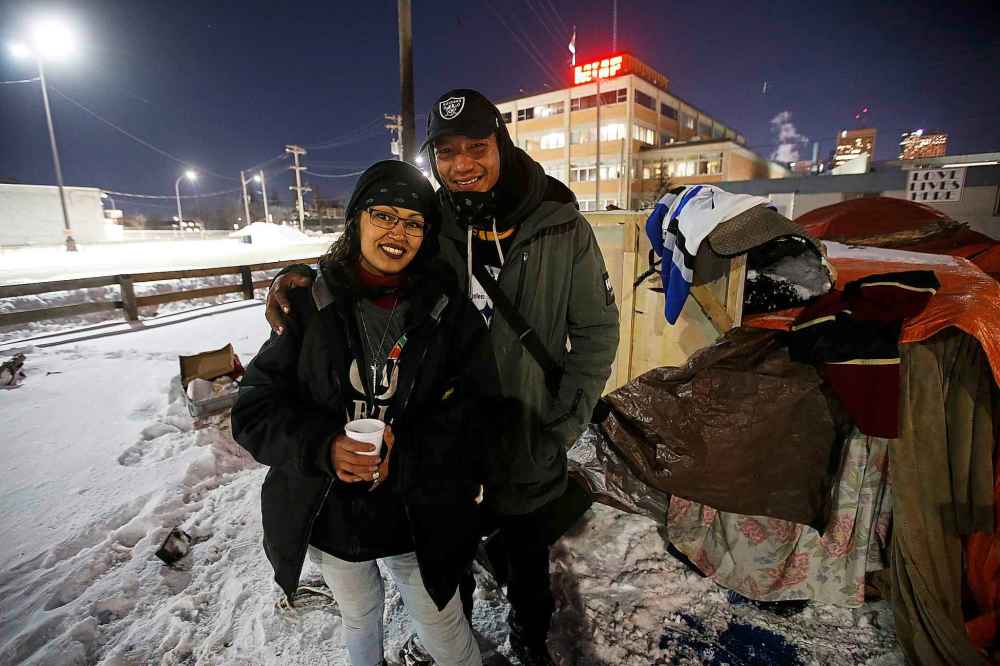
The outreach team hands out cups of coffee, bottles of water, loaves of bread and winter gear to whoever wants them — with each item accounted for in a large black ledger Halvorsen carries — before loading back into the vehicle and continuing down the road.
Left behind in their wake are Kyle and Desirae, shivering near their tent, plotting how best to stay warm during the long night ahead.
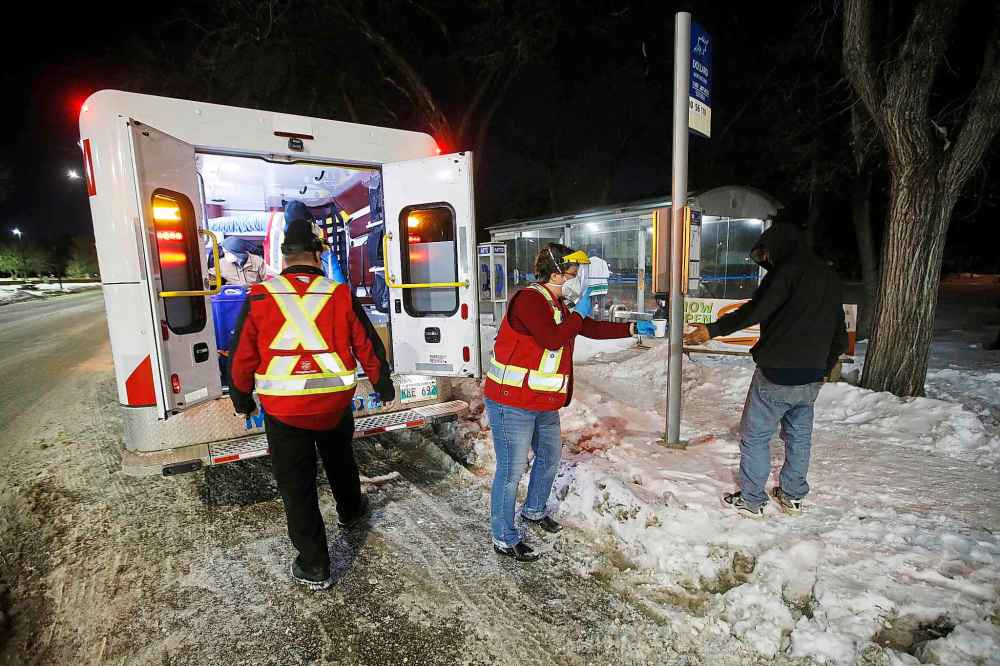
Halvorsen drives the old ambulance through the streets with grace, sliding through slush in search of people in need, in search of people to serve. When they find them, whatever they have, they give.
Whenever the team passes someone walking down a side street or back alley, Halvorsen eases his foot off the gas pedal, slowing the vehicle to crawl as he asks through the open window if they need help.
Some people are suspicious of the outreach team, with one man refusing to take a cup of coffee until Halvorsen drinks from it first to prove it’s safe. But most have interacted with them before and recognize Halvorsen by sight.
“Do you have any masks?” asks a woman, her pupils large and dilated, her speech slurred.
“No masks,” Halvorsen says.
It’s a conversation repeated throughout the night. Requests for masks, are becoming increasingly common, but the Salvation Army doesn’t have enough to share. It’s clear some on the streets are worried about catching the virus, although others don’t appear to know there’s a pandemic at all.
Mostly men, many Indigenous
It’s estimated 35,000 Canadians are homeless on any given night, and at least 235,000 people experience homelessness each year. Seventy-three per cent of them are men, 18 per cent are youth, roughly 30 per cent are Indigenous and two per cent are military veterans.
In the North End, at 12:54 a.m., Halvorsen stops and speaks to two young men walking in the cold. Neither is dressed for the weather—no winter jackets, no toques, no gloves, no scarves.
They’re not homeless, just trying to walk to the West Broadway area after the cab they called didn’t show up. Halvorsen swings open the doors to the back cabin and tells them to get in.
The men appear to be in their early 20s. One has a large tattoo on the back of his hand, and another on the left side of his neck. The other man’s face is covered in acne that scabs in spots.
“It’s crazy about that virus and stuff, right?” the first man says, as the vehicle passes through the intersection of Portage and Main, heading west.
“It’s hard to believe it. I still don’t believe it, really. This shit is like a movie.”
After dropping them off, Halvorsen and Burton disinfect the seats in the back cabin with soap, water and bleach. Each time they transport someone, they clean the seats again—rinse and repeat.
“Some people question why we do it,” Halvorsen says, wiping down the seat with a rag.
“Because we just don’t know. We just don’t know.”
Halvorsen winds through The Forks before crossing the Provencher Bridge and making his way into St. Boniface. He passes a man riding a bicycle with stripped parts from other bikes balanced on the handlebars.
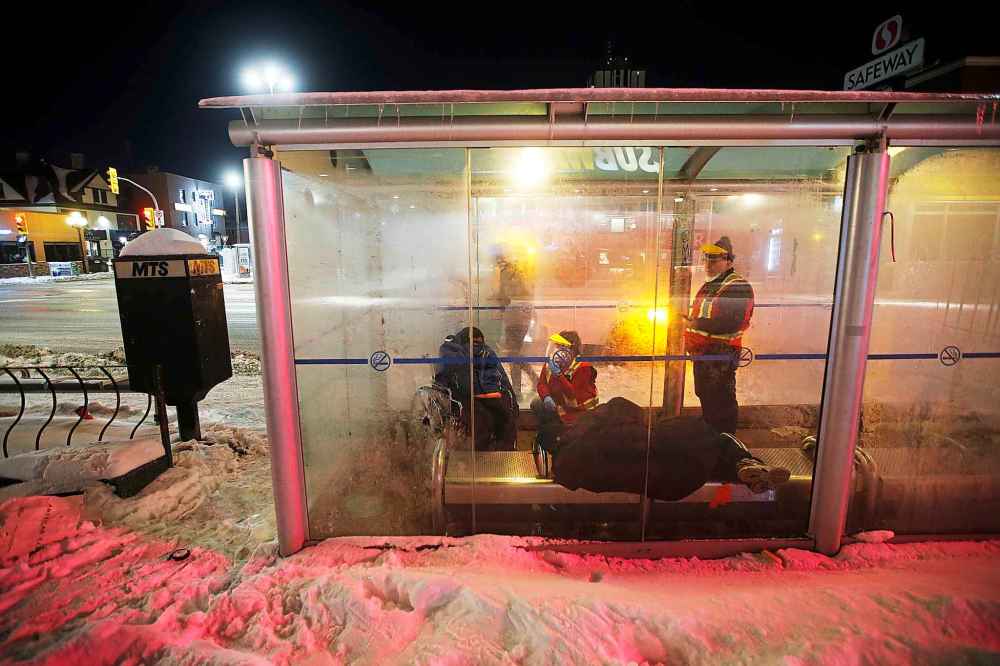
The vehicle comes to a stop at the bus shack across from St. Boniface Hospital. There are four people inside trying to escape the cold. Two of them are asleep, curled up on the metal bench. Only one of them has a blanket.
A man and a woman step out and ask for a cup of coffee to start. Soon, they’re given more. While Burton and Dueck help them, Halvorsen steps inside the shack to check on the other two.
He speaks to them for several minutes, and as he does, one of them coughs — harsh and loud, attempting to expel phlegm caught deep in his lungs. The men are given cups of coffee, loaves of bread and some winter gear.
Outside the shack, the lid on a garbage bin has been lifted to provide easier access.
When they’re finished, Halvorsen jumps back behind the wheel, and as he slams the door shut, says, “Well, we almost had someone to take to the meth program, but he decided to stay here.”
“It just breaks my heart,” Burton says, shaking his head, as an old space heater squeaks and wheezes warmth into the back cabin.
“I just can’t imagine staying there all night. It’s just so cold.”
“I just can’t imagine staying there all night. It’s just so cold.–John Burton”
At 2:22 a.m., Halvorsen stops outside the bus shack at Osborne Street and River Avenue. Inside is a man laying on the bench and a woman in a wheelchair. A cardboard sign with “anything please” scrawled across it sits nearby on the ground. The floor is littered with trash.
The woman in the wheelchair is in distress. Tears stream down her face as she gasps and sobs. At times, she appears to be hyperventilating. As Halvorsen and Dueck approach her, she yells out that she’s pregnant and recently had a seizure.
“Are you alert? Can you think clearly?” Halvorsen asks, kneeling at her side.
The woman rattles off more ailments she claims to have, including diabetes and low blood pressure. It’s unclear if what she’s saying is true, but Halvorsen can tell she needs medical attention. He pulls out his cellphone and dials 911, asking for an ambulance to be dispatched to the scene.
In the meantime, he does what he can to keep her calm.
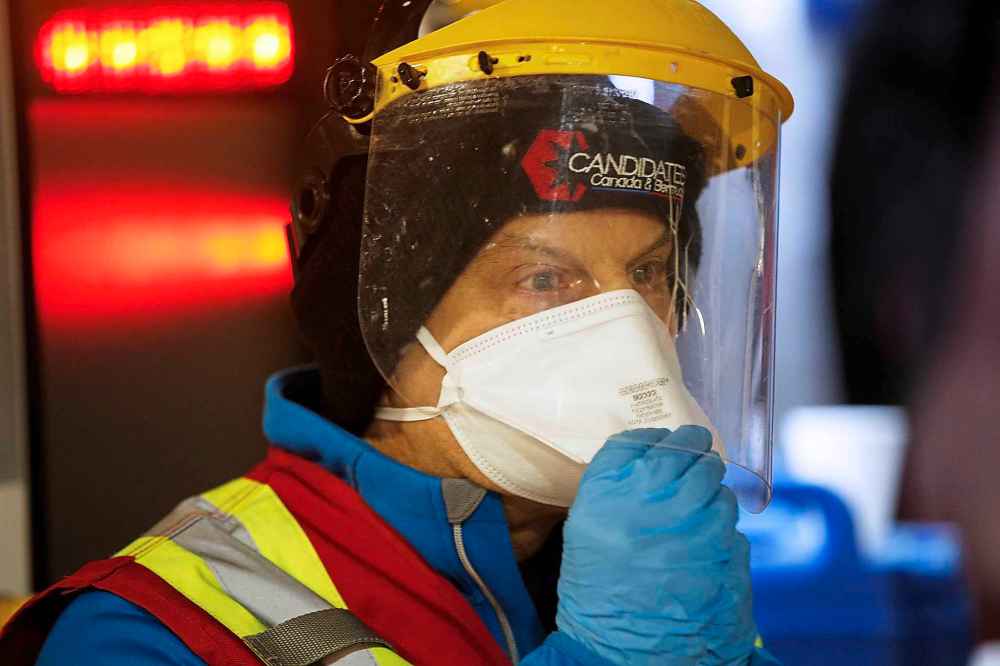
A fire department van and an ambulance pull up to the shack at 2:34 a.m., their emergency lights flashing into the pitch-black night. One of the paramedics approaches the shack, but doubles back to the ambulance muttering, “Wait, I need to put on a face mask.”
The paramedics attend to the woman, and Halvorsen and Dueck get back in the old ambulance.
“I hope she gets the help she needs,” Halvorsen says, driving north.
For the next hour-and-a-half, Halvorsen, Burton and Dueck stop at as many bus shacks as they can — up and down Portage Avenue and elsewhere throughout downtown — offering whatever supplies they have left to whomever they meet.
It’s a routine the Salvation Army outreach team will repeat throughout the pandemic, over and over and over again — as case counts spike, as hospitals are pushed to the brink, as deaths pile up.
“I try to put others before myself. If I get sick, I get sick. I don’t want to and I’m going to take whatever precautions I can, but the pandemic is not going to stop me from going out and serving my community,” Burton says, seated in the back cabin as the night draws to a close.
“You have to have faith in God’s plan.”
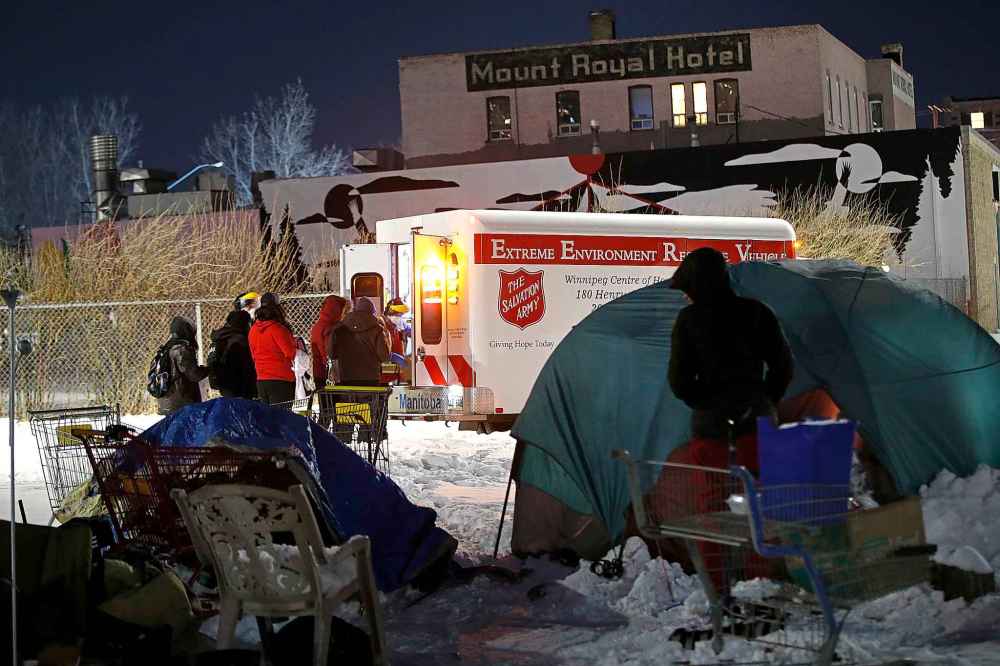
At 4:02 a.m., Halvorsen pulls to a stop outside the Centennial Concert Hall, handing out the night’s final cups of coffee to the people sleeping in the bus shack. The juxtaposition of such poverty right next to the performing arts centre and directly across the street from city hall is striking.
A desperately cold woman approaches the vehicle and asks if she can be driven to the overnight shelter.
“Of course,” Halvorsen says, before leading her to the back cabin, where Burton greets her and helps her get settled in.
Their shift is technically over, but Halvorsen and his team aren’t finished yet; there’s one last trip to make before calling it quits.
There’s one last person to serve.
ryan.thorpe@freepress.mb.ca
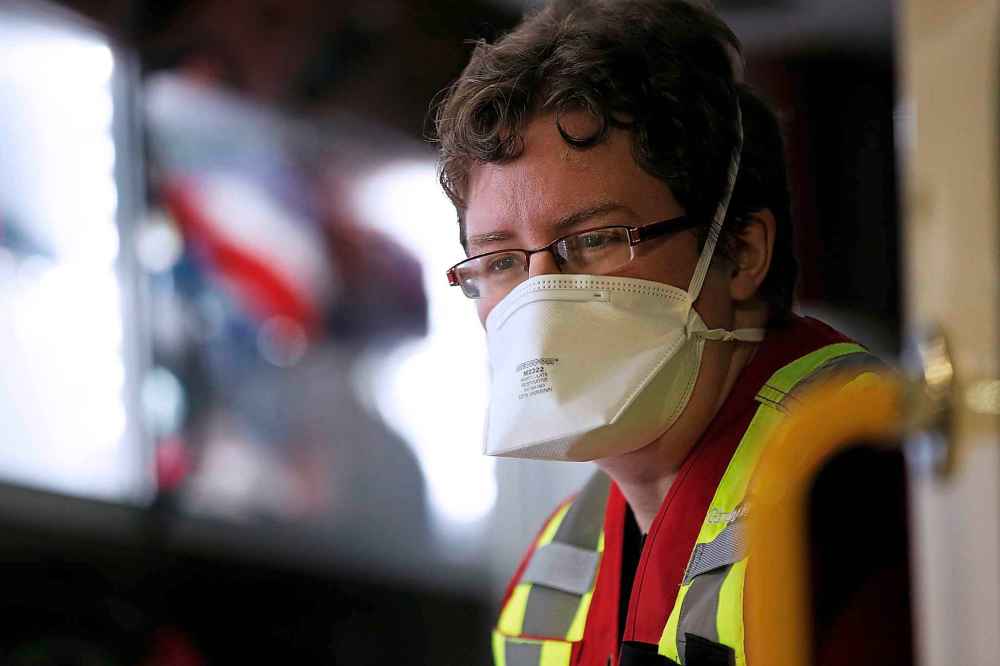
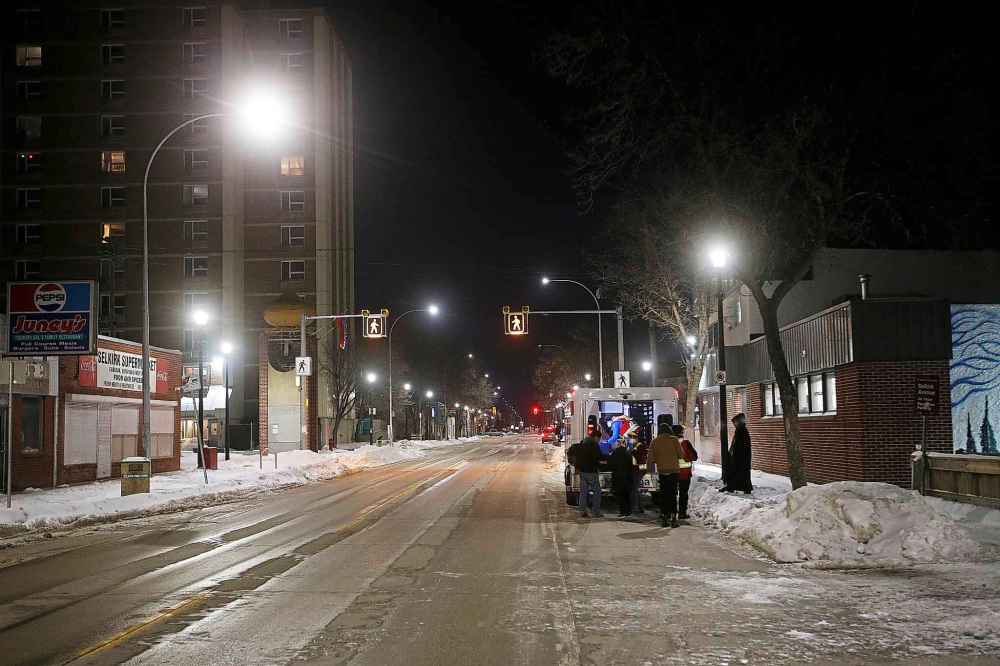
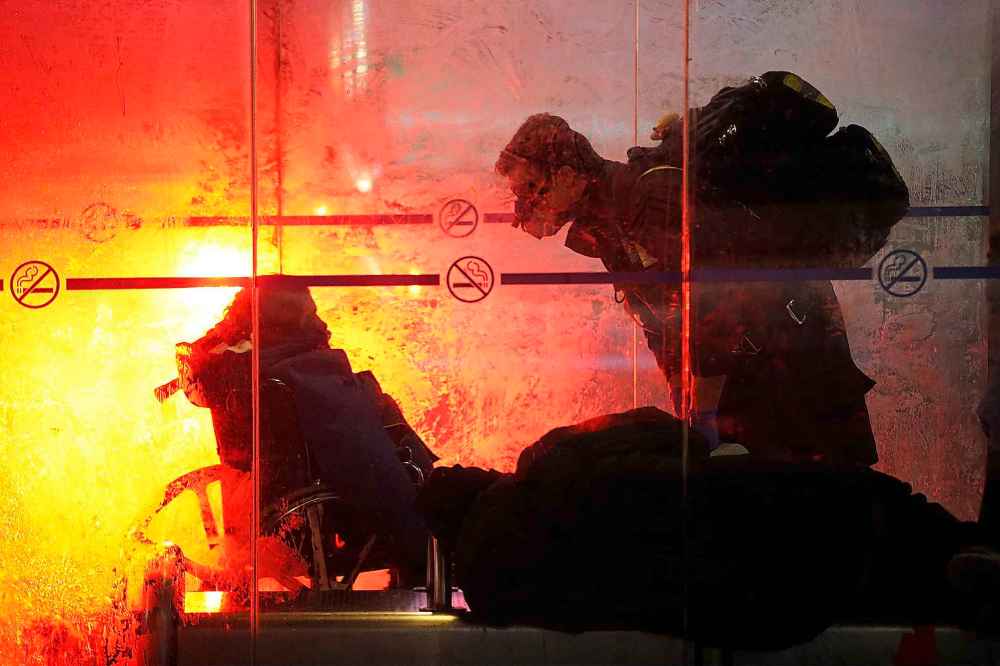
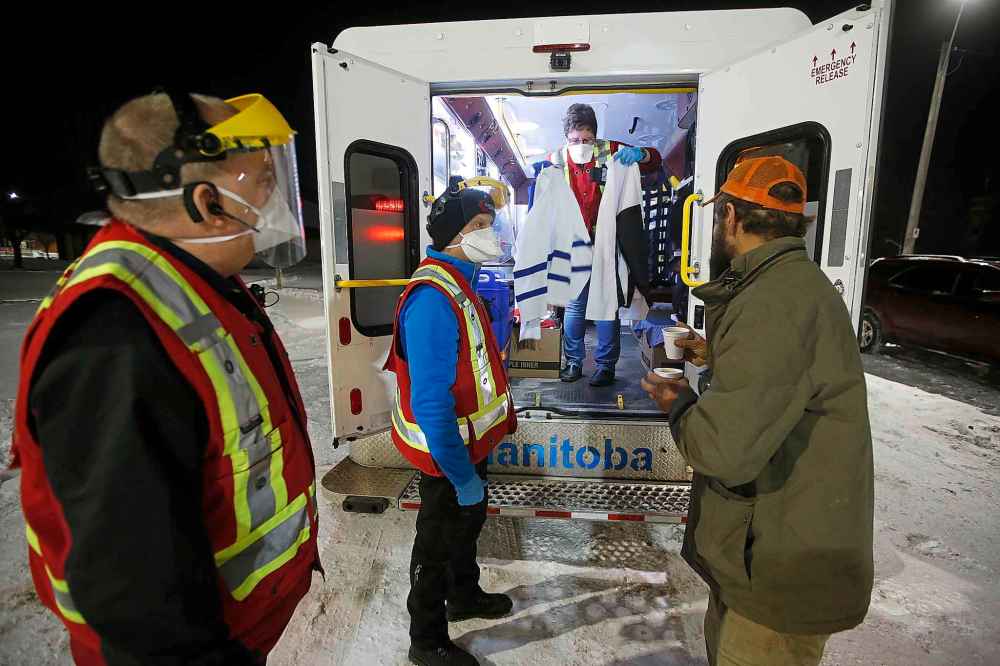
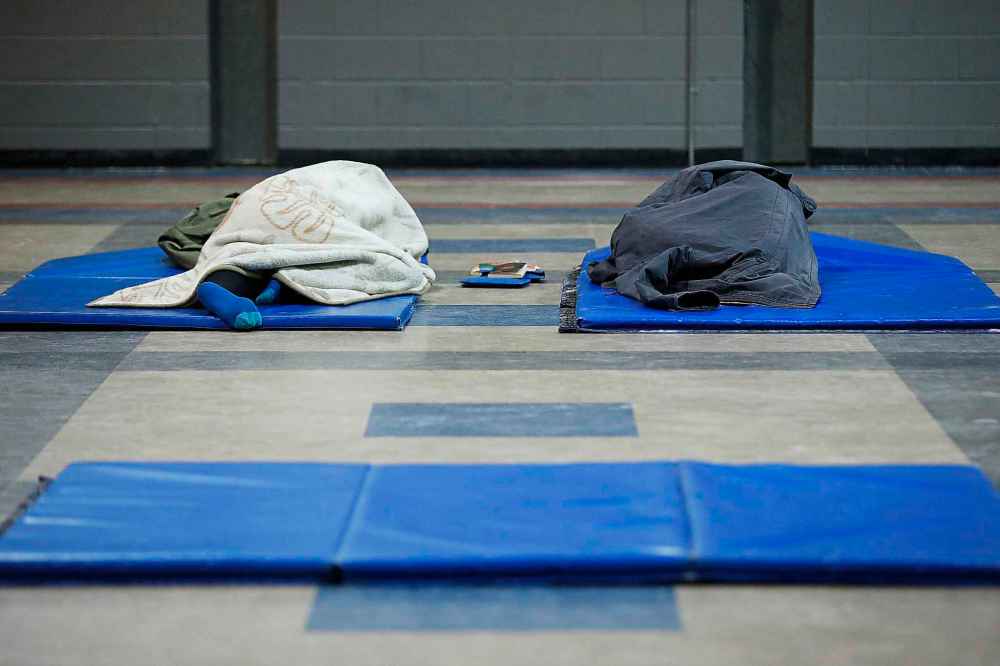

Ryan Thorpe likes the pace of daily news, the feeling of a broadsheet in his hands and the stress of never-ending deadlines hanging over his head.
Our newsroom depends on a growing audience of readers to power our journalism. If you are not a paid reader, please consider becoming a subscriber.
Our newsroom depends on its audience of readers to power our journalism. Thank you for your support.

